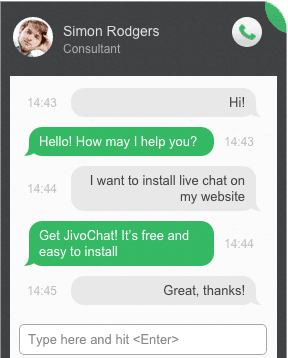Communications for websites.
One of the most discussed use case in WebRTC is the one where a visitor on a website get to contact the website’s owner or representative directly from the web page.

A vendor doing just that is JivoChat, who provide a really elegant and simple solution that escalates from text chat to voice by using WebRTC.
Timur Valishev, Co-founder and CEO of JivoChat, took the time to answer a few of my questions.
What is JivoChat all about?
JivoChat lets website owners to text-chat with visitors on their websites to provide instant assistance and support. It helps to grow online sales, increase response speed and improve customer satisfaction.
What are you using WebRTC for?
As alternative to text chat we provide voice calls from the browser.

Has that been helpful to your customer base?
I can’t say that click-to-call browser voice calls are our killer feature, but a lot of customers use it every day.
You offer text and voice communications. Have you thought about adding video as well?
Yes, we did. We analyzed current implementations of the video calls in some call centers and came to a conclusion that it’s not really an effective solution to solve any real business problem especially in the market of SMBs that we are focused on.
You decided to use VoxImplant as your WebRTC PaaS provider. With your “simple” use case – why not build it on your own?
Although simple, this solution should be reliable and scalable to handle thousands of calls without failure. All that requires expertise that we decided we don’t want to invest in. At the same time, VoxImplant has the required expertise and provide services at a reasonable cost, so it makes sense for us to go with VoxImplant.
Where do you see WebRTC going in 2-5 years?
It will definitely grow. All apps are moving towards the browser, and I can’t see the reason why communications should be an exception. If (or should I say when?) the day will come when we’ll have IPv6 working for most of the Internet and we won’t have all that NAT connectivity issues, the world would be much better place.
If you had one piece of advice for those thinking of adopting WebRTC, what would it be?
I think one should anticipate much wider adoption of WebRTC in the future and at least prepare software architecture to support it.
Given the opportunity, what would you change in WebRTC?
Include more codecs in the standard browsers to eliminate transcoding.
What’s next for JivoChat?
We are focused on making our products simple, easy-to-use and effective in solving day-to-day tasks. We do not aim to create killer-features, instead we go with incremental increase of the value for our customers. Soon we will be releasing a set of features for our customers that will make them even closer to their clients.
–
The interviews are intended to give different viewpoints than my own – you can read more WebRTC interviews.
